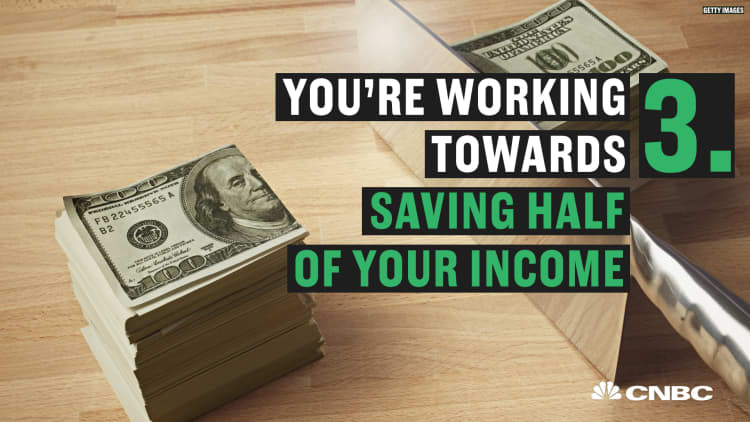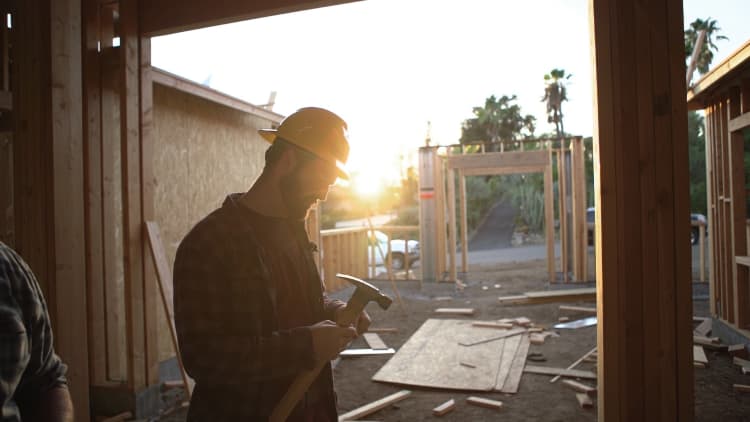Some financial missteps — paying a bill late or splurging on an unnecessary new accessory — can be swept under the rug.
Others will haunt you.
You don't want to get to your golden years and realize you never got to see the world. Or worse, that you don't have enough cash in the bank to sustain your retirement.
While it's important to tune your financial decisions to your individual goals, here are seven money mistakes that you could end up regretting for life.

Not saving for retirement
The No. 1 financial regret Americans share is not saving enough for retirement, according to a 2016 survey by Bankrate. Eighteen percent of all survey respondents said that they regret not putting money away for later, with a full 27 percent of respondents over 65 citing it as their biggest regret.
Not only will you begin to feel more pressured and unprepared the older you get, but by waiting to pad your retirement savings accounts, you're missing out on the power of compound interest.
If you aren't already taking advantage of your employer's 401(k) plan, sign up. Financial experts typically recommend contributing at least 10 percent of your salary, but start with however much you can.
If you don't have a retirement savings plan at work, you can contribute to other tax-advantaged accounts designed specifically for retirement, such as a traditional IRA, Roth IRA or myRA.
And if you're already using a retirement savings plan, spend a few minutes setting it to auto-increase by a certain percentage every year. That way, you'll eventually work your way up to 10 percent and barely notice.
Buying a house you don't need
While buying a home can be a good investment, it's not right for everyone. It's a huge financial undertaking and should reflect your future plans as much as your current situation. If you're planning to switch jobs, get married or have a baby in the near future, think about how those choices will affect where you want to live and the kind of home you'll need.
It's also smart to wait until you have a solid reason to invest in a house. Don't pull the trigger just because you can afford to.
Chris Reining, a self-made millionaire who retired at 37, learned this the hard way. He calls the $200,000 house he purchased in his 20s "the worst financial decision I've ever made." Reining explains that once he graduated from college and secured a stable job, buying a home felt like the next logical step.
"With home buying, a lot of people don't question it — and I didn't question it either," Reining tells CNBC. "I just bought it because I thought, 'Oh, everyone buys a house. That's what you want to do, right?'"
Not always.

Skimping on insurance
Buying insurance can feel like carrying an umbrella on a sunny day: It's annoying and seems unnecessary, but when the skies cloud over and the thunder starts, you're glad you have it.
In other words, don't forgo insurance in the name of saving a few bucks each month. Whether it's a surprise medical expense, expensive pet surgery or replacing stolen items after a break-in, you'll be glad you have it when it's necessary.
You don't need every type of insurance, but in addition to home, health and auto insurance, it's smart to look into life, disability and long-term care plans as well. "These are covering risks that could jeopardize your future savings plans, and they have their own complexities," Juli McNeely, certified financial planner with McNeely Financial Services and immediate past president of the National Association of Insurance and Financial Advisors, tells CNBC.
Not traveling
Whether you're paying off debt, saving up to buy a house or loading up your retirement accounts, it never hurts to invest money in future freedoms. But sometimes, it's also worth it to splurge a little.
In a study of 2,000 adults conducted by Claris Financial, 29 percent of Americans named "not being able to take that trip of a lifetime" as their top financial regret — tied with not being able to buy a house. The sentiment holds true no matter how you slice it: "Among all age groups, only six percent regretted the money they spent traveling, while close to 20 percent said they traveled 'a lot' and had no regrets," Money reports.
Travel doesn't have to break the bank, either. By holding out for cheap flights, taking advantage of credit card rewards and avoiding fees, it's possible to see the world on a budget. For more inspiration, check out how experienced travelers save money abroad.

Waiting to invest
The earlier you start investing, the better. Thanks to the power of compound interest, through which any interest earned accrues interest on itself, a little money invested now can amount to more than a lot of money invested later.
Sallie Krawcheck, a former Wall Street executive and founder of Ellevest, encourages everyone, especially women, who are less likely to get into the stock market, to start investing in their 20s and 30s. She warns that by not doing so, you're sacrificing "tens of thousands, hundreds of thousands, sometimes millions of dollars" over the course of your life, she tells Business Insider.
You don't need to be rich to get started, either. Apps such as Acorns invest your spare change, and robo-advisors such as Wealthfront and Betterment manage any amount of cash with low annual fees.

Racking up unnecessary debt
Before taking on any type of debt, it's important to evaluate exactly how it will affect you in the future. Will a second degree help you land a higher paying job? Can your family afford to take on a mortgage right now?
While borrowing is sometimes worth it — student loans can allow you to pursue a college degree and ultimately make more money, for example — debt can make it much harder to save for retirement or build an emergency fund.
Thanks to sky-high interest rates, credit card debt is especially difficult to pay off — but still unnervingly easy to rack up. Pause before the next time you swipe your card. Will you be able to pay off your bill in full this month if you make this purchase? If not, you might want to put the plastic away.
Don't miss: The biggest mistake first-time home buyers make




